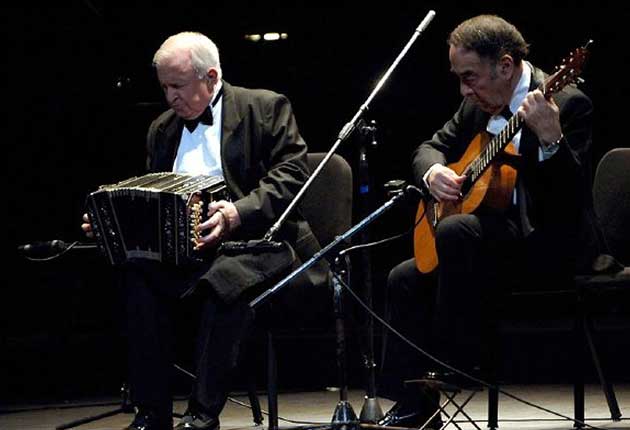
It's a shame Café De Los Maestros are so often referred to as the Argentinian Buena Vista Social Club, because the description only goes a fraction of the way to describing the charm of the orchestra's loose collective of tango musicians from the genre's heyday in the South America of the 1940s and 50s. Accompanied by an orchestra featuring seven violinists, cello, double bass and grand piano, the artists who shuffle on to the stage are largely some distance into old age. With the tango in full flow, and bandoneóns bobbing up and down on the musicians' skinny knees, it's easy to feel like the Barbican has been transported back in time. In a sense, that's what's happened: many of the evening's pieces have only survived through transcriptions of the old 78s on which they were originally documented.
In the late withdrawal of Alberto Podestá, one of the group's most famous singers, the concert loses one of its big names; luckily though, his absence is more than compensated for, with accomplished vocal performances from such luminaries as Juan Carlos Godoy and Nina Miranda, who captivates the audience with her renditions of classics. Born in Uruguay, Miranda resembles a South American Cilla Black, and raises almost as many smiles from the orchestra's octogenarian bandoneónists as she does from an audience who are so impressed that they struggle to know how to react.
It is a running theme of the evening that though the very mature, very English audience clap in all the right places, such expertly performed tango music demands to be accompanied with dancing. When performers take to the stage for "La Puñalada" to show the physical side of tango music, the wishes of more than a few audience members are granted. Providing a focal point for the orchestra, it's a pity only two songs are accompanied in this way.
The evening is full of moments of brilliance; Juan Carlos Godoy clutching his heart at the climax of "Alma en pena" after delivering an electrifying vocal performance comes to mind, as does Anibal Arias' solo guitar rendition of "Sur". But perhaps the tragedy of the show is that the music seems out of place in the cavernous Barbican Hall, which appears sanitised and overwrought in comparison to the music which fills it, songs of elegance and raw energy for which this audience, perhaps, will never quite be ready.
Subscribe to Independent Premium to bookmark this article
Want to bookmark your favourite articles and stories to read or reference later? Start your Independent Premium subscription today.

Join our commenting forum
Join thought-provoking conversations, follow other Independent readers and see their replies